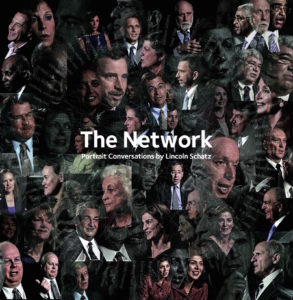The Book
 “Lincoln Schatz’s The Network uses an innovative technological matrix to introduce the people, ideas, and interconnections that drive our nation forward. Leaping past conventions of “artist” and “sitter,” “picture” and “viewer,” this interactive and immersive group portrait will revolutionize our sense of how power operates, and what art can reveal. A truly extraordinary experience.”
“Lincoln Schatz’s The Network uses an innovative technological matrix to introduce the people, ideas, and interconnections that drive our nation forward. Leaping past conventions of “artist” and “sitter,” “picture” and “viewer,” this interactive and immersive group portrait will revolutionize our sense of how power operates, and what art can reveal. A truly extraordinary experience.”
–Paul Roth, Senior Curator and Director of Photography and Media Arts, Corcoran Gallery of Art, Washington, D.C.
“Lincoln Schatz is the most important and daring portraitist of the twenty-first century. He brings a singular vision as well as technological wizardry to rendering the most influential people of our time. The Network is his most ambitious project yet: As a portrait of not merely a group of individuals but also a portrait of power, The Network is entirely new and destined to define our moment in time for ages.”
–David Granger, Editor in Chief, Esquire
“It’s not easy being a Washingtonian; Congress’s approval rating is at an all-time low and many Americans believe that our system is, if not totally broke, in need of some help. Schatz’s book, a companion to an ongoing video portrait exhibition at the National Portrait Gallery, is a pleasant and well-timed effort to burnish the image of the folks inside the Beltway. Familiar faces such as former Supreme Court Justice Sandra Day O’Connor are joined by people like anti-tax GOP operative Grover Norquist and Michael Kaiser, the president of the John F. Kennedy Center for the Performing Arts. The world of Washington, D.C. workers—lobbyists, secretaries, deputies, directors, elected officials, judges, chairpersons, and journalists—is presented in an earnest, easy to read history-book style. The Chicago-based Schatz, an artist but not a journalist, spent about 45 minutes with each subject and the book showcases photo stills and edited first-person transcripts from those sessions. Based on the innocuous narratives, Schatz was not going for gotcha moments nor was he challenging his subjects. These rosy portraits may have limited appeal if you’re a jaded insider, but for the average American adult or school child, they’re chock full of worthwhile details and telling anecdotes.”
— Publishers Weekly